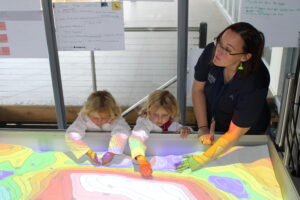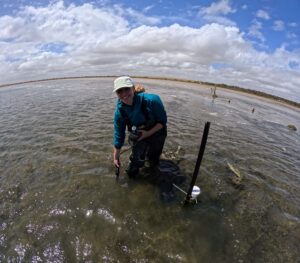
The Australian and South Australian governments have announced the next $22.2 million of funding to help get the Coorong back on track for a healthy future. The Coorong is culturally, environmentally and economically important at local, national and international scales but the ecology of the southern Coorong has deteriorated. Most notably this has included large reductions in the abundances and some waterbirds, particularly fairy tern and migratory shorebirds, with the Coorong considered the most important refuge site for waterbird populations in the Murray-Darling Basin. This is associated with the prevalence of filamentous algae that is preventing aquatic plants from completing their life-cycle and interfering with the ability of waterbirds to feed on both plants and invertebrates in mudflats. New management interventions informed by evidence may be required to support these populations and the Coorong ecosystem more generally.
The Goyder Institute for Water Research has begun investigations to support the Department for Environment and Water (DEW) by identifying management interventions to help restore the iconic Coorong. The Goyder Institute had previously provided independent, expert science advice to DEW through an Expert Panel, comprised of leading scientists with experience in all aspects of the Coorong’s ecology. The Expert Panel’s report outlined a series of short, medium and long-term actions to restore the Coorong’s South Lagoon. These recommendations, along with those identified in the Coorong Summit Summary Report informed the $70 million agreement between the Minister for Environment and Water Hon. David Speirs MP and the Murray-Darling Basin Ministers, to help get the Coorong back on track.
Approximately $2 million was released immediately to support the Commonwealth and South Australian Governments to develop the Healthy Coorong, Healthy Basin Action Plan, begin planning for the Healthy Coorong, Healthy Basin program and undertake urgent investigations. As part of this initial phase, the Goyder Institute and DEW have partnered to establish a project for Priority investigations to restore the ecological character of the South Lagoon of the Coorong. It includes leading scientists with expertise in the Coorong from The University of Adelaide, DEW, South Australian Research and Development Institute, Flinders University, CSIRO and The University of South Australia.
As part of this project, researchers have been assessing the Coorong’s food resources to understand how they may be influenced by different water regimes and hence affect waterbird and fish populations. This has included sampling invertebrate and fish assemblage sites along a salinity gradient of the Coorong. They found that food availability and energy content of potential food items (e.g. macroinvertebrates) for shorebirds and fish was higher in the North Lagoon and Murray Mouth compared to the South Lagoon. The total abundance of small-bodied fish was well below a long-term average.
Aquatic vegetation and filamentous algae investigations are also underway. Filamentous algae prevents aquatic plants, like Ruppia tuberosa, from completing their lifecycle. R. tuberosa is a key food for some waterbirds and provides habitat for fish. Researchers have found that filamentous algae is attaching to aquatic plants throughout much of the Coorong, reducing seed production and germination of new plants. Laboratory experiments with algal cultures have shown that algal growth can be controlled under specific temperature, salinity and nutrient conditions. This is being used to update models for predicting habitat availability for algae and aquatic plants and inform the management of existing infrastructure and assessing responses to new infrastructure that may be considered for restoring the Coorong. The researchers have also developed a new method to detect and map floating algae in the Coorong via satellite imagery. This will be used to monitor changes over time and understand the conditions under which algal blooms occur.
Early work in the project has also assessed the potential of Tolderol wetlands, which are located on the northern shores of Lake Alexandrina, as complementary waterbird habitat for key species of the Coorong. Findings show that these man-made wetlands provide good quality habitat for waterbirds, including small migratory waders. As such, the findings provide a ‘proof of concept’ that if expanded or applied to similar managed wetlands elsewhere could provide complementary habitats to support high value, at-risk waterbirds from the Coorong. Priority wetlands have also been identified in the Lower Lakes and in the Upper South-east which may be able to provide further habitat for waterbirds and improve the health of waterbird populations within the Coorong.
The project results will inform early management interventions and feed into the design of the subsequent Healthy Coorong, Healthy Basin Program, that will be aimed at restoring the Coorong ecosystem.
Contact Dr Kane Aldridge, Goyder Institute for Water Research, for more information about the project or read more about Project Coorong updates.
This project is part of the Department for Environment and Water’s Healthy Coorong, Healthy Basin Program, which is jointly funded by the Australian and South Australian governments.



